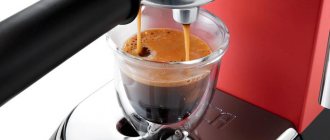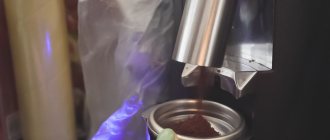Capsule coffee machines have appeared on sale relatively recently. They are convenient for household use and do not require special care, so they quickly gained popularity. When purchasing a device, you need to take into account that only the types of capsules for coffee machines recommended by the manufacturer are suitable for it. An incorrect choice will damage the device.
Types of capsules for coffee machines
Before purchasing capsules, you need to understand their characteristics. They may be intended for single or multiple use. Different packages make different drinks, sometimes the kit already contains all the ingredients, including, for example, milk powder. Other manufacturers offer different types of coffee, and if you want to add milk, you need to take care of it yourself. Let's look at the differences in order.
By number of uses
Containers can be disposable or reusable.
The advantage of disposable ones is obvious, this is the quality of the drink. Freshly dried, roasted, ground coffee, hermetically packaged, has the ability to preserve maximum taste and aroma.
Reusable containers are economical. Their advantages:
- the price of one serving is lower than with single-use tablets; Having paid for reusable containers, it is enough to buy traditional grain packaging;
- brewing occurs under high pressure of 15 bar, which allows you to make maximum use of the resource of coffee powder; carob coffee makers with such high pressure are several times more expensive;
- You can mix different types of coffee, spices, additives.
The other side of the coin is the lower quality of the drink:
- some, and often significant, time passes between opening the package and the start of preparing the drink; the quality of the powder decreases;
- containers that are not hermetically sealed become deformed under pressure and form small empty areas that prevent effective brewing.
The most popular reusable capsules:
- Coffeduck;
- My Cap;
- Emohome;
- Tassimo;
- Sealpod.
When choosing reusable containers, you need to check their compatibility with your coffee maker model.
By type of drink
In addition to traditional espresso, manufacturers began to sell packages with kits for preparing other drinks: latte, cappuccino, hot chocolate, Americano, lungo and others.
Often, one drink requires the use of two or more capsules in turn. You will have to stop the water supply, replace the tablet, turn it on again and pour in the next ingredient. Such manipulation, as a rule, causes an increase in the price of the portion.
Benefits of reusable capsules
The main advantage of capsules is the standard portion when preparing a delicious drink. After use, they are thrown away. Coffee lovers drink it at least once a day - the amount of waste is growing. To minimize waste and also save money, you can use reusable ones, and then the benefits are even greater. Empty cups can be filled with different blends, sugar, milk and other additives can be added as needed. You can adjust the strength of the drink. One cup is enough for thirty uses.
Important! If you plan to use the remaining tank for refillable use, one should be from the same brand as your machine. Also, buy them in trusted stores or from official representatives. Otherwise, there is a high probability that you will get a fake at the price of the original. In addition, a fake does not always fully meet the requirements of the device and can disrupt its smooth operation.
Which capsules are suitable for different coffee machines?
As mentioned above, when choosing a coffee maker and capsules, you need to check their compatibility. We list the compatibility of popular brands:
| Capsules | Coffee maker |
| Nespresso | Nespresso, some Krups models, KitchenAid |
| Dolce Gusto | Krups Dolce Gusto, Delonghi |
| Tassimo | Bosch |
| Clafissimo | Tchibo |
| Lavazza | Lavazza |
| Squesito | Squesito, Philips |
| Paulig Cupsolo | Paulig |
| Cremesso | Cremesso |
| Illy | FrancisFrancis |
Where to buy and how to store capsules
Most manufacturers have made sure that storing capsules is convenient. The containers are sold in special packaging that does not take up much space. Some manufacturers also produce special rack holders. This option makes it easier to sort and use your brew containers.
Gradually, capsules from top brands have ceased to be in short supply and today you can buy them without any problems (previously this was the main disadvantage of capsule coffee machines). For example, Nespresso products can be ordered directly on the manufacturer’s website nespresso.com/ru/, the same applies to Dolce Gusto – dolce-gusto.ru. There is also a wide selection of capsules available in stores coffeemanich.ru, mvideo.ru and others.
Leading manufacturers of capsules for coffee machines
The most popular brand in the world is Nespresso from Nestle . The assortment includes more than 20 varieties, differing in the type and strength of ground coffee. If you want to prepare a drink containing milk, you can simply pour it in or use a cappuccinatore first. Cappuccino makers are included with coffee makers.
The second most popular are Dolce Gusto , also produced by Nestle through the company Nescafe . The number of varieties of drinks is comparable, the filling is fundamentally different. There is no variety of varieties, but numerous drinks with the addition of cocoa, milk powder, and teas are offered.
Tassimo capsules filled with Jacobs coffee have 15 varieties, mainly coffee drinks with the addition of other dry ingredients (milk, cocoa).
The world's favorite Tchibo tablets and packages atomizers under the Cafissimo . The assortment looks modest compared to Nestle. However, careful control ensures high quality. The manufacturer offers various coffee blends. There are no drinks with powdered milk or cocoa. Cafissimo is not widely available in supermarkets, but is available for order in many online stores.
The list of leading manufacturers would not be complete without the company Lavazza with the product of the same name Lavazza . There are about 20 types of capsules on sale in two model versions. Various types of coffee are offered. Milk, cocoa and other ingredients are not presented.
Pros and cons of capsule coffee machines: tested on ourselves
First about the advantages
- First of all, it's convenience. The capsule machine is extremely comfortable to use and does not require any additional knowledge about making coffee. So much so that even a child can handle it (especially if you pour water in advance, insert the capsule and talk about safety precautions).
- Price is a strong argument in favor of a capsule coffee machine. Unlike professional automatic equipment, they are quite inexpensive.
- Compactness and pleasant appearance , which is very important for a small kitchen where it is impossible to find space for large appliances.
- Stable result . Capsule coffee cannot be spoiled. At all. The capsules are of the exact volume needed to prepare the drink; the machine is pre-programmed, and there is no way to influence the taste by accidentally transferring the coffee or over-extracting it.
- Quite a large selection of coffee , including specialty coffee. If just a few years ago it seemed that coffee capsules were not an option for the advanced, and there were only a few blends on sale, now even the parent company Nespresso produces more than 30 types of capsules with both Arabica and Robusta blends and pure Arabica from Ethiopia , Brazil, Colombia, etc. To this you can add a wide selection of capsules from other manufacturers, for example, Italian monosorts and blends from Coffesso.
- Coffee capsules do not lose their flavor and aroma properties due to the sealed packaging filled with inert gas. You can keep a supply at home without worrying about it becoming tasteless.
Some disadvantages of capsule coffee
- The first minus comes directly from the plus: the user cannot influence the coffee preparation process in any way. Those who prefer stronger or weaker coffee will be forced to use other methods of preparing the drink.
- High price. The cost of an original capsule (that is, one cup of coffee) starts from 35–40 rubles. For comparison: the cost of coffee prepared in other types of coffee machines rarely exceeds 10–12 rubles per cup (20–22 for cappuccino and other drinks with milk). The wallets of owners of capsule coffee machines are saved by manufacturers of compatible capsules.
- When buying coffee, you need to be careful not to accidentally order capsules for Nespresso instead of capsules for Dolce Gusto (usually all the information is on the packaging, but it seems that every owner of a coffee machine of this type has at least once discovered an annoying mistake when unpacking their purchases) .
Eric Favre, engineer and inventor of the coffee capsule.
Benefits of coffee capsules
When we decide to drink a cup of coffee, we begin to enjoy the drink before we take the first sip. Aroma is an important component. It can fill the entire space of a coffee shop or apartment. When it comes to ready-made espresso or cappuccino, it's great. But the intoxicating smell from whole or ground grains quickly turns them into second-rate material. Manufacturers of coffee, tableware, and accessories are constantly improving methods for storing beans and powder in the least possible contact with air and light.
A new level of quality has been achieved with the advent of capsule coffee makers.
A capsule is a packaged portion of ground coffee pressed into a tablet, which is inserted into a coffee maker when closed. Immediately at the moment of preparing the drink, the coffee maker itself pierces the shell and passes a stream of steam under a pressure of 15 bar through the tablet.
This technology has undeniable advantages:
- hermetic packaging preserves the aroma and taste of the pulverizer until the moment of preparation;
- the speed of preparing a portion takes less than a minute;
- Factory-packed coffee is not poured into different containers using different devices, and there is no risk of foreign particles getting in;
- The high pressure of the steam jet along with the preparation disinfects the parts of the coffee maker involved in the process.
What to look for when choosing capsule coffee machines
Pressure level
This is the most important indicator that you should focus on before choosing a capsule coffee machine. The pressure should be from 15 to 19 bar: it is at this water pressure that the drink is most aromatic.
There is one exception to this rule - Tassimo coffee machines. They pass water under a pressure of only 3.3 bar. True, capsules for machines of this type are made according to a different principle, in the form of disks. They are heavier (9 grams instead of 7), the coffee is not pressed in them, so much pressure is not required to extract the coffee.
Disadvantages of coffee capsules
When purchasing a capsule coffee maker, you need to take into account its unpleasant features:
- the designs of machines of different brands have differences, tablets of a certain brand are suitable only for certain devices;
Attention! Some models of the same brand require different capsules.
- The cost of compressed tablets is an order of magnitude higher than standard packaging.
At the time of writing, a box of 16 tablets weighing each from 6 to 10 grams (depending on the type of drink) of a popular brand costs 369 rubles as a promotion. For comparison, a standard 250 gram package of ground or bean coffee can be purchased for 250 rubles or less.
Why choose capsule coffee
The first and main reason is the taste of the drink, its quality. The capsules are packed with fine, uniform grinding, protected from contact with light and oxygen. It makes excellent espresso, cappuccino, flat white, latte, etc. The dosage is strictly maintained, designed for preparing one serving.
Sealed capsules can be stored for up to a year, maintaining the taste characteristics and aroma of grinding. This is difficult to do with coffee ground at home. Even in a tightly closed jar, crushed grains lose some of their aroma within a week.
The brewing technology itself in capsule-type machines and coffee makers is much simpler than in automatic machines. All you have to do is place the capsule in the appropriate compartment and press the button - in a minute or two the drink is ready. The used container will simply need to be thrown into the trash.
The only task for lovers of this coffee will be the correct choice of capsules. They should be compatible with the coffee machine, and ideally the same brand as the machine. At the end of the article you can see the rating of coffee capsule manufacturers.
Environmental safety of compostable capsules
Recent studies have shown that plastic bags, which are said to be biodegradable, can survive three years after being buried or in the ocean, and plastic containers have at least as long a lifespan.
Compostable capsules are considered to be completely environmentally friendly and can be disposed of directly as organic waste during differentiated waste sorting.
This means that - compared to traditional capsules made of plastic and aluminum - the compostable capsule completely solves the end user's waste disposal problems, as they no longer need to be cleaned or freed from coffee grounds before disposal.
In other words, biodegradable capsules offer the same practicality and ease of disposal as coffee capsules, but at the same time they come with elegantly designed coffee machines: this often increases their appeal to consumers interested in not only having an efficient coffee machine in their home, but and have an elegant piece that will bring prestige to any modern kitchen.
So what about compostable capsules?
Both Colonna-Dashwood and Humbert agree that they are not very good because they are rarely disposed of correctly. If you throw a compostable capsule into a municipal incinerator, composting it won't do any good.
“People often think that compost is inherently better, but that’s not always the case,” says Humbert. The production of a compostable capsule is as polluting or even more polluting than the production of a plastic one. And if it ends up in a landfill, it decomposes to produce methane, which ends up in the air,” Humbert says.
“However, if compostable capsules are not thrown into the regular trash, but placed in special containers that are sent to compost or, better yet, to biomethane production facilities, then they are better than aluminum or plastic (even if both of these are widely recycled ),” says Humbert. The problem is that this rarely happens these days.
However, companies are experimenting with compostable materials, and Lavazza, for example, recently launched its own compostable capsule called Ricco.
Colonna-Dashwood is also exploring the possibility of creating compostable capsules.
“People will continue to work on compostable capsules, and if someone comes out with a new biopolymer, I'm very open to that,” he says.
London-based Sendero Specialty Coffee has made compostable capsules from biopolymers such as starch, glucose and lignin found in tree bark.
“The capsules biodegrade within six months and can be thrown away just like food waste,” says co-founder Hutan Farbood.
Water and coffee
Because Column-Dashwood's coffee shop is close to the University of Bath, many students and professors come here regularly, and from time to time he chats with them about coffee and the science behind it.
That's what happened in 2012 when he made a latte for Chris Hendon, a chemistry graduate student. They started chatting about how the composition of water affects the taste of coffee; the discussions led him to first co-author a paper in the Journal of Agricultural Food Chemistry and then a book, Water for Coffee.











